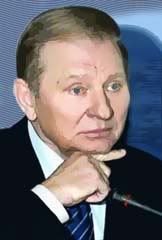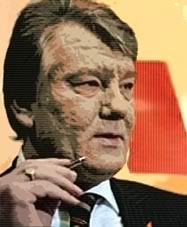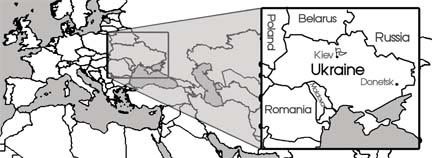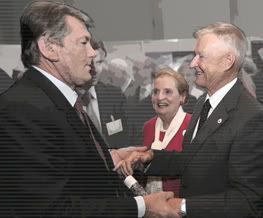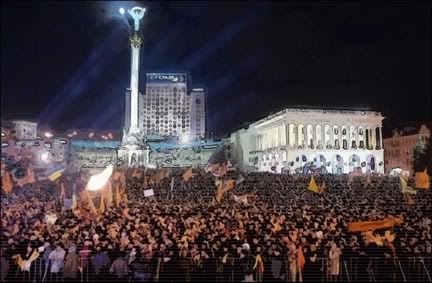2004: THE CURIOUS CASE OF THE RUINED FACE
Adam Larson
Caustic Logic / Guerillas Without Guns
2/23/07As Ukraine hovered with the two Viktors (opposition leader Yushchenko and PM Yanukovych) running neck and neck for the presidency in the Halloween 2004 election, things got spooky. On the night of September 5, the opposition front-runner attended a small private dinner meeting with senior Ukrainian officials, including Ihor Smeshko, the head of the Security Service of Ukraine (SBU, successor to the Ukrainian KGB). The meeting was held at the cottage of Volodymyr Satsyuk, recently resigned from the SBU to focus on his other job in Parliament. Yushchenko brought along none of his security detail, and in the end he brought along only his campaign manager David Zhvania, who had arranged the meeting. Yushchenko later explained that, for whatever reasons, this dinner was the only time he did not take security measures to test his food.
But Viktor's wife Kateryina, keen as she is, said that she tasted ‘a metallic-smelling medicine’ on her husband's lips after he returned home. Yushchenko went straight to bed and fell seriously ill by the next morning. He toughed it out for a few painful days before checking in at a private clinic on the 10th by which time the mysterious illness had reportedly caused severe internal problems and nerve paralysis on the left side of his face. As September wore on, his doctors were powerless to stop his face from erupting in a dense gray mask of Chloracne cysts. The results weren’t clear right away, but his doctors concluded he would live and should continue campaigning while they ran more tests.
The Rudolfinerhaus clinic Yushchenko checked into was in Vienna, Austria, and presided over by a Dr. Michael Zimpfer, who explained in December, nearly three months after the fact, “at the present stage, we are still investigating the hypothesis of poisoning. However, we have not found any indication that a chemical or biological substance has been employed.” Further complicating diagnosis was the four-day delay between the outbreak of the ailments and his arrival at the hospital, and Yushchenko’s early refusal to allow biopsies of his face (he didn’t want it wrapped in gauze while campaigning). RFE/RL confirmed that “Yushchenko, upon his release from the clinic, said the doctors' statements proved he had been intentionally poisoned. In fact, the Viennese doctors left this open as a possibility, but
reached no definitive conclusions.” (emphasis mine)
| Yushchenko soon after his alleged poisoning. |
But even with this lack of evidence, the medical team finally decided on a “descriptive diagnosis,” not to be taken as conclusive, that Yushchenko had suffered from severe, intentional dioxin poisoning, reportedly the second-highest dose on record. Dioxins are a class of pervasive industrial pollutants, and everybody has some dioxin in their systems. But Dr. Zimpfer said tests showed Yushchenko’s blood samples contained more than 1,000 times the normal amount of TCDD, a particularly toxic form.
These chemicals are not efficient killers; they cause cancer and predispose one to other ailments like diabetes – if they kill at all, it’s indirectly and after years. Only a few cases of acute poisoning are on record. One unsolved case from 1997 had five textile workers poisoned with a particularly strong isomer of dioxin; two fell gravely ill but neither died. This worst-case scenario happened, of all places, in Vienna - the very City Yushchenko would travel to for his diagnosis seven years later.
While the experts concur that dioxin usually takes weeks or months to show symptoms, Yushchenko fell ill the very morning after his September 5 dinner with Satsyuk and Smeshko. Campaign manager David Zhvania believed in the poisoning theory, and pointed the finger at President Kuchma or Russian elements working through organized crime figures. But he denied the “stupid theory” of a poisoning at the dinner he had arranged, citing a more probable poisoning while Yushchenko was in the Crimea (loaded with Russian mafia types) in late August. But Yush himself continued to favor the more dramatic and less logical story that implicated top leaders directly; in a 2005 interview with CNN, he was asked if he’s been poisoned at the Sept. 5 meeting. He replied “most likely.”
Dr. Zimpfer at the Rudolfinerhaus supported the theory as well; “we suspect involvement of an external party, but we cannot answer as to who cooked what or who was with him while he ate.” An excellent article by paleo-conservative writer Justin Raimondo sorts out the doctors at the center of this high-pressure situation; the widely-quoted Dr Zimpfer was the President of the clinic's Board of Supervisors, an administrative figurehead and not hands-on in the case. The chief medical doctor was named Lothar Wicke, and it as he who initially oversaw Yushchenko's treatment and held a press conference just after his patient's first visit. Before the international media, he accused unnamed individuals of spreading “medically falsified diagnoses concerning the condition of Mr. Yushchenko.”
Wicke never outright revealed who was telling what lies, but Zimpfer reportedly told him at one point “Yushchenko's people will not be happy and will take other measures.” An article from the UK Telegraph, one of the rare mentions in the Western media, claims that Wicke’s “life was threatened after he cast doubt on the diagnosis” and that “the clinic came under intense pressure from Mr Yushchenko's entourage to diagnose poisoning,” with or without evidence. As the pressure mounted, Wicke finally resigned his position on December 9, removing himself from the picture. The case was taken over by Dr. Nikolai Korpan, who was certain of a poisoning scenario; asked if the aim of the poisoning had been to kill the opposition candidate, Dr. Korpan snapped “yes, of course.” Raimondo clarifies that Korpan is “a surgeon, not a specialist, brought in by Yushchenko on the occasion of his first visit to Vienna.”
The Ukrainian authorities of course denied the charge that they had been involved in any poisoning. There is “no logic in such an accusation,” said Taras Chornovyl, Yanukovych's campaign manager. Other supporters voiced their own concerns. Stepan Havrysh, a political ally of Yanukovych said that while he pitied Yushchenko in his plight, “I'm afraid, two weeks before the vote, it's all political technologies.” This is a term usually reserved for public relations and election strategies. Others simply used the episode to taunt Yushchenko, speculating that his sudden disfigurement was from Herpes or some other disease a moral degenerate might pick up. Others have cited his long history with alcohol and food-triggered illness, and wondered if he didn’t drink too heavily and gorge himself on foods he knew would make him sick.
No matter the truth, Orange revolution supporters and Pora-types were sure the corrupt regime had tried to silence their leader. “Everybody knew he was poisoned so we didn't really need official tests,” said Anatoly Klotchyk, with all his nineteen years of wisdom to draw on. Likewise, the western media primarily took the word from the Vienna clinic that implicated Yanukovych or his Russian backers. The UK paper The Observer in December uncritically quoted an official in the Yushchenko camp that the poisoning was “clearly planned by professionals, perhaps former employees of the KGB.” Yushchenko “has confronted the disease in a fighting spirit,” the Observer article noted, “appearing during the mass protests without cosmetics to tell them that his scarred face was that of the dirty politics of Ukraine.” He went further than simple metaphor on Sept. 21; standing before the assembled Ukrainian Rada, he told the nation’s lawmakers through his cyst-covered face “do not ask who is next. Every one of us will be the next.”
Yet at the same time he wanted no immediate investigation into who poisoned him - and had hit-listed the entire parliament - until after the December election. “I don't want this factor to influence the election in some way – either as a plus or a minus,” he told the press. “This question will require a great deal of time and serious investigation. Let us do it after the election – today is not the moment.” The government’s investigation went ahead anyway, but a New York Times piece by C.J. Chivers from late 2004 noted “a chief obstacle has been Mr. Yushchenko himself, who has used the poisoning almost as a theme in his campaign, but has not fully cooperated with the authorities, even as the trail of his would-be assassin grows cold.” He was “busy with his campaign,” and besides, as campaign manager Zhvaniya explained, they had no faith that the official investigation would be anything other than a whitewash that would conceal the involvement of the authorities and their Russian backers.
Jane’s Intelligence Digest summarized the downside of the episode for Moscow-Washington relations. When coupled with other, known, Russian involvement in Uraine’s politics, news of the poisoning was “likely to lead to a reassessment of Western foreign policy towards Putin's increasingly authoritarian Russia.” The Observer compared this bizarre cloak-and-dagger episode to the “Cold War world of a John le Carré novel.” For those unfamiliar, a John le Carré novel is a fiction, penned in the west, crafted to glamorize a great Anglo-American struggle against Russia. It should be taken as no small irony that Kuchma’s or Moscow’s alleged choice to try to poison the opposition leader into submission should have caused such a reverse effect, giving him a projected ten-point boost to 60% projected vote, according to one Ukrainian analyst, who summed up “if we suppose this was organized by the authorities, who wished to disfigure [Yushchenko], then they lost.” He survived the attempt, unembarrassed and just as ambitious as ever. “Everything is going well,” he told supporters, wrapped in an orange scarf as he returned to campaigning. “I plan to live for a long time and I plan to live happily. I am getting better health every day.” And soon, of course, he would be President of Ukraine.
Sources:
- “Probing the Plot to Poison Ukraine's Yushchenko.” St. Petersburg Times. Issue #1044(10), Tuesday, February 15, 2005. http://www.sptimes.ru/index.php?action_id=2&story_id=2747
- Chivers, C.J. “A Dinner in Ukraine Made for Agatha Christie.” New York Times. December 20 2004.
- Yushchenko's Poisoning: The Background” Jane's Intelligence Digest. January 21, 2005. Added January 27 2005 to http://eng.maidanua.org/static/emai/1106783418.html
- Associated Press. “Doctors seek cause of Yushchenko illness.” USA Today. December 8 2004. http://www.usatoday.com/news/world/2004-12-08-austria-yuschenko_x.htm
- Bransten, Jeremy. Ukraine: Doctors Debate Whether Opposition Leader Was Poisoned. RFE/RL. September 24, 2004. http://rferl.org/featuresarticle/2004/09/6346bded-0125-4d10-a4ee-296efffb6eba.html
- Schechner, Sam. "What Is Dioxin, Anyway?" Slate. December 13, 2004. http://www.slate.com/id/2110979/
- Loof, Susanna. “Ukrainian Presidential Candidate Viktor Yushchenko Poisoned With Dioxin.” Associated press. December 11 2004. http://www.mindfully.org/Pesticide/2004/Ukrainian-Yushchenko-Dioxin11dec04.htm
- Raimondo, Justin. "The Yushchenko 'Poison Plot' Fraud: He's poisoning Ukrainian politics with lies." Antiwar.com. December 15, 2004. http://www.antiwar.com/justin/?articleid=4164
- Pancevski, Bojan. "I received death threats, says doctor who denied that Ukrainian leader was poisoned." Telegraph. March 27 2005. http://www.telegraph.co.uk/news/main.jhtml?xml=/news/2005/03/27/wukr27.xml&sSheet=/portal/2005/03/27/ixportal.html
- Stoyanova-Yerburgh, Zornitsa. “Who Poisoned Yushchenko?” Worldpress.org. December 13 2004. http://www.worldpress.org/Europe/1995.cfm
- Nagle, Chad. “Booze, Salo and Mare's Milk... Did Yushchenko Poison Himself?” Counterpunch. December 20 2004. http://www.counterpunch.org/nagle12202004.html
